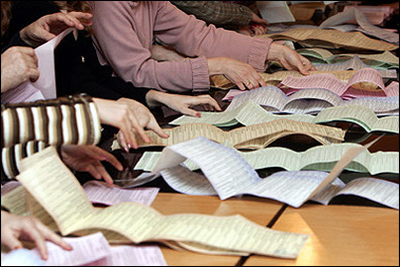
RUSSIAN STRATEGISTS PONDER POLITICAL IMPLICATIONS OF UKRAINIAN POLL
Publication: Eurasia Daily Monitor Volume: 3 Issue: 63
By:

As Ukrainian political forces are engaged in tough backstage bargaining to form a ruling coalition in the newly elected parliament, Russia is warily eyeing its western neighbor’s political scene following the March 26 poll. Although the party of Moscow’s old favorite won the largest number of votes of all the five groupings that entered the Ukrainian legislature, the Kremlin’s ability to influence Kyiv’s domestic and foreign policy appears to be rather tenuous, according to analysts.
The government of Russian President Vladimir Putin seems to have learned a lesson after its rude interference in Ukraine’s 2004 presidential election led to an embarrassing fiasco. This time round, the Russian “political technologists” largely stayed away from the Ukrainian campaigning, and overall the Kremlin expressed its preferences with regard to the neighboring country’s political parties and individual politicians far more cautiously.
In a March 28 statement, the Russian Foreign Ministry described Ukraine’s electoral process as an “acute political struggle” but noted that Russian and international observers, who monitored the March 26 vote, concluded that the election was valid. “In seeking to build a system of interstate relations based on principles of equality, friendship, pragmatism, and mutually beneficial cooperation, Russia looks forward to an intensive dialogue with the Ukrainian president, new cabinet, and new Verkhovna Rada,” the ministry said.
But all the stated good intentions notwithstanding, the Kremlin is clearly bothered by three developments that have the potential to powerfully affect Russia-Ukraine relations: the growing “unpredictability” of Ukraine’s domestic politics, the precarious status of the energy agreement between the two countries, and Kyiv’s seemingly inexorable drift toward the Euro-Atlantic institutions.
Most Russian pundits agree that the recent Ukrainian elections once again underscored that politically, geographically, and linguistically, Ukraine is a divided country. However, the plurality of votes garnered by Viktor Yanukovych’s allegedly “pro-Russian” Regions of Ukraine Party will not necessarily lead to Moscow having more leverage over Kyiv’s politics. The trick is that the various dividing lines cutting across Ukraine prevent the executive — or any other branch of power, for that matter — from forming what in Russia and other post-Soviet lands is known as a “party of power.” Ukraine’s pronounced regional differences, so vividly reflected in the voting patterns, coupled with the recently enacted constitutional changes that gave more political clout to the local parliament, paved the way for the emergence of a political system in Ukraine that differs markedly from those existing in the other former Soviet republics. It is a system where there is no absolute winner. “From now on, no one in Ukraine will enjoy absolute power,” one perceptive Russian observer has noted.
Some Russian experts warn that such a model is inherently unstable and will perpetuate the acute inter-party strife and continuous political crises. Russian-Ukrainian relations will suffer from this instability, they argue: the relationship between the two countries will remain a contentious issue in Ukraine’s domestic politics and will be hotly debated among the Russian policy elite as well.
But other Moscow analysts disagree, pointing to the fact that, regardless of the endless coalition split-ups and inevitable government changes, the basic principle — namely, the inability to usurp absolute power — will remain intact, thus providing the system with a degree of stability.
In fact, if Ukraine succeeds in further modernizing and liberalizing its political and economic system, some liberal-minded Russian theorists argue, this will seriously affect the political situation inside Russia. The real problem in the relations between the two Slavic countries that the recent Ukrainian ballot has so strongly highlighted is that Moscow and Kyiv are moving along increasingly divergent trajectories: the former is headed toward an authoritarian political system and state capitalism dominated by Kremlin-connected business groups, while the latter is struggling, however inconsistently, to build a socio-economic system largely modeled on the European template. In this sense, Russian liberal thinkers note, the Kremlin is not terribly interested in Kyiv’s democratic breakthrough, lest the neighbor’s example become too enticing for the Russian populace to emulate.
The likely prospect of the new government in Kyiv revising the controversial Russian-Ukrainian energy agreement constitutes another Kremlin concern. The gas deal concluded earlier this year caused an outcry among Ukraine’s political class across the board — both in the west and the east of the country. Some Russian strategists, likely seeking to preempt Kyiv’s move to revise the deal, suggest the energy problem become a matter of a trilateral dialog among Russia, Ukraine, and the European Union. But a number of Russian experts point out that under the terms of the contracts with the Europeans, Russia sells gas to the EU countries on the western, not eastern, border of Ukraine; consequently, any future problems with Kyiv over the price of gas or transit tariffs are Moscow’s own headache that, even from a legal point of view, cannot be passed on to the EU.
Finally, there is a perceived threat of Ukraine’s joining NATO in the near future — some Russian experts mention a time span of two to four years. This process is seen in Moscow as inevitable, regardless of which political force — a “pro-Western” or a “pro-Russian” one — is the senior partner in a coalition government in Ukraine. The Kremlin appears to be slowly coming to grips with the reality that has recently been described by one influential Russian commentator as follows: “In Ukraine, there never were and cannot be pro-Russian politicians.”
(Vedomosti, March 30; Rossiiskaya gazeta, Nezavisimaya gazeta, Vremya novostei, March 29; RIA-Novosti, Kommersant, March 28)




